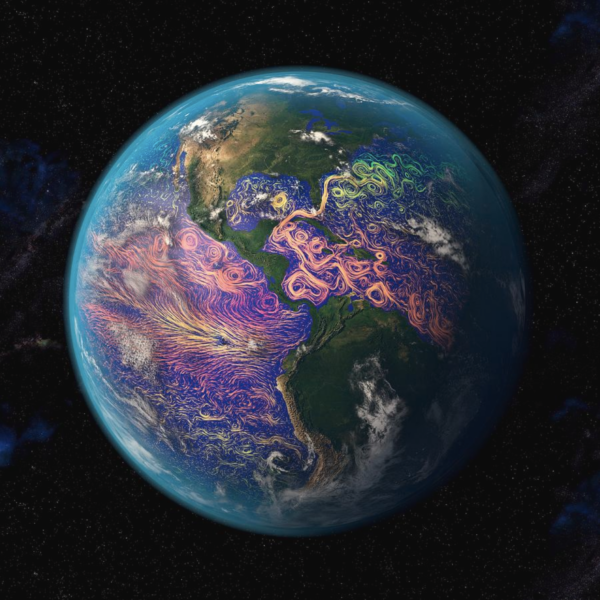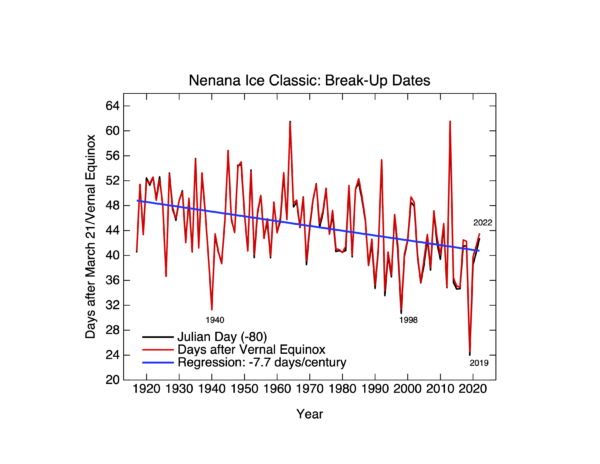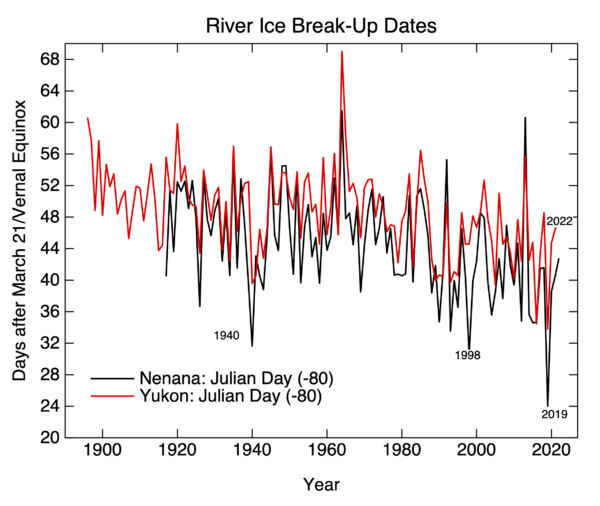Some of the authors of a recent commentary on k-scale modeling respond to RealClimate.
[Read more…] about Overselling k-scale? HmmClimate Science
Mmm-k scale climate models

What’s good (and what’s not quite ready) about plans for ‘k-scale’ climate modeling?
[Read more…] about Mmm-k scale climate modelsUnforced variations: June 2022
This month’s open thread. New commenting rules (as described last month) remain in effect. Basically, be substantive, one comment a day, remain polite.
Unforced Variations: May 2022
Sorry for delay posting this month, but we’ve been considering how (or if) to go forward with open threads and comments. Looking at the multitude of constructive comments on the “End of blog comments” thread, it’s clear that many people appreciate the possibility of comments here, but that too often it disappoints by devolving into tedious bickering. There were many theories for why! Without necessarily subscribing to any particular diagnosis (there are many that capture some elements of what happens), we have decided to continue with comments for the time being, but with a few modifications.
To encourage people to post less often, but more substantively, we will limit commenters to one comment a day (so make it count!). Additionally, we will try to enforce a ‘one comment, one point’ rule to avoid people just cramming ten comments into one. Moderation of insulting, abusive, or just tedious comments will continue. Think more ‘Letters to the Editor’ than graffiti on the bathroom wall. This will hopefully also allow for more engagement from the RC scientists.
Back in the day, one of the goals of setting up the ‘Forced Variations’ threads was to segregate the more contentious arguments around solutions into one place, but that seems to have run it’s course. Thus we are going to revert to a single open thread, with a slightly broader climate theme than previously. Comments on generic political arguments or other issues that are not directly tied to climate will still be excluded.
We will let this play out for a couple of months and then reevaluate. Let us know what you think.
So with no further ado, let this month’s open thread begin…
River Ice break-up trends 2022
As in previous years, the spring break-up of river ice on the Tanana River at Nenana and the Yukon River at Dawson City in Canada (new! h/t Ed Wiebe), is a great opportunity to highlight phenology that indicates that the planet is in fact reacting to the ongoing global warming. As we’ve done in previous years, the Nenana dates can be plotted and show a clear trend towards earlier break-ups (by about 8 days/century over the whole record, or 13 days/century since 1975).

2022 was on trend, and in 2014, I noted that May 3rd was the most likely date given the trends until then.
Dawson City in the Yukon is about 250 miles east of Nenana which is close enough for the seasonal anomalies in climate to be quite highly correlated. So one might expect that the break-up dates would be similarly correlated… and indeed they are:

The ice at Dawson breaks up on average 3.8 days later than the ice at Nenana (5.1 days this year), but the correlation between the two series is an impressive 0.82. There have been 15 times the ice went out within 24 hours of each other and in 1963 they broke up less than 3 minutes apart! The trends are likewise very similar 7.7±3.8 days/century for Nenana, compared to 6.5±3.1 days/century since 1917. This pretty much puts paid to the occasional claim of the urban heat island in Fairbanks affecting the water and causing the trend.
[Update: I misunderstood the Yukon river break up website, and erroneously stated that the break-up was on May 2nd. It was not. I’ll update this again when it has. Apologies.]
[Update II: The Yukon river ice broke up on May 7, and I’ve updated the graph and text.]
Digital Twinge
A couple of weeks ago the EU announced that they were funding a project called DestinE (Destination Earth) to build ‘digital twins’ of the Earth System to support policy making and rapid reaction to weather and climate events.
While the term ‘digitial twin’ has a long history in the engineering world, it’s only recently been applied to Earth System Modeling, and is intended (I surmise, as does Bryan Lawrence) to denote something more than the modeling of either weather or climate that we’ve been doing for years. But what exactly? And is it an achievable goal or just a rebranding effort of things that are happening anyway?
[Read more…] about Digital TwingeThe modern demarcation problem
Defining (and enforcing) a clear line between information and mis-information is impossible, but that doesn’t mean misinformation doesn’t exist or that there is nothing to be done to combat it.
I found myself caught in an ‘interesting’ set of exchanges on twitter a few weeks ago (I won’t link to it to spare you the tedium, but you could probably find it if you look hard enough). The nominal issue was whether deplatforming known bull******s was useful at stemming the spread of misinformation (specifically with respect to discussions around COVID). There is evidence that this does in fact work to some extent, but the twitter thread quickly turned to the question of who decides what is misinformation in the first place, and then descended into a free-for-all where just the very mention that misinformation existed or that the scientific method provided a ratchet to detect it, was met with knee-jerk references to the Nazi’s and the inquisition. So far, so usual, right?
While the specific thread was not particularly edifying, and I’ll grant that my tweets were not perfectly pitched for the specific audience, this is a very modern example of the classic Demarcation Problem (Stanford Encyclopedia of Philosophy) in the philosophy of science.
[Read more…] about The modern demarcation problemIssues and Errors in a new Scafetta paper
Earlier this week, a new paper appeared in GRL by Nicola Scafetta (Scafetta, 2022) which purported to conclude that the CMIP6 models with medium or high climate sensitivity (higher than 3ºC) were not consistent with recent historical temperature changes. Since there have been a number of papers already on this topic, notably Tokarska et al (2020), which did not come to such a conclusion, it is worthwhile to investigate where Scafetta’s result comes from. Unfortunately, it appears to emerge from a mis-appreciation of what is in the CMIP6 archive, an inappropriate statistical test, and a total neglect of observational uncertainty and internal variability.
[Read more…] about Issues and Errors in a new Scafetta paperReferences
- N. Scafetta, "Advanced Testing of Low, Medium, and High ECS CMIP6 GCM Simulations Versus ERA5‐T2m", Geophysical Research Letters, vol. 49, 2022. http://dx.doi.org/10.1029/2022GL097716
- K.B. Tokarska, M.B. Stolpe, S. Sippel, E.M. Fischer, C.J. Smith, F. Lehner, and R. Knutti, "Past warming trend constrains future warming in CMIP6 models", Science Advances, vol. 6, 2020. http://dx.doi.org/10.1126/sciadv.aaz9549
The Future of Climate Modeling?

There was an interesting workshop last week focused on the Future of Climate Modelling. It was run by the World Climate Research Program (WCRP) Core Project on Earth System Modelling and Observations (ESMO) which is part of a bewildering alphabet soup of various advisory committees that exist for mostly unclear historical reasons. This one actually does something useful – namely it helps organize the CMIP activities that many modeling groups contribute to (which inform the assessment reports like IPCC and various national Climate Assessments). They had a wide variety of people and perspectives to discuss the changing landscape of climate modeling and what people want from these models. You won’t agree with everything, but it was informative.
[Read more…] about The Future of Climate Modeling?